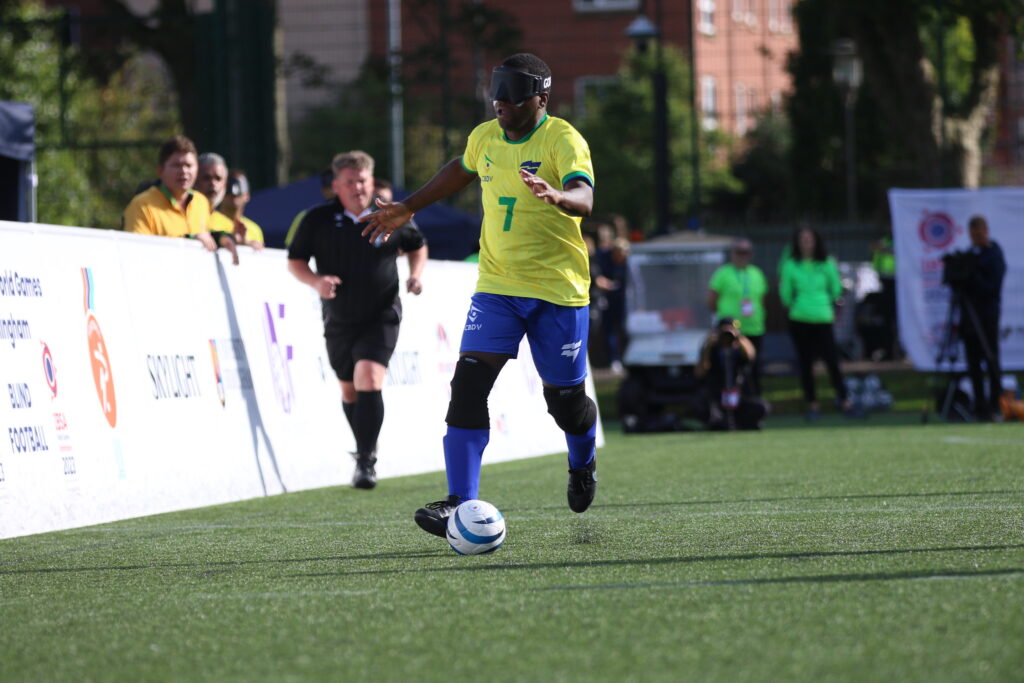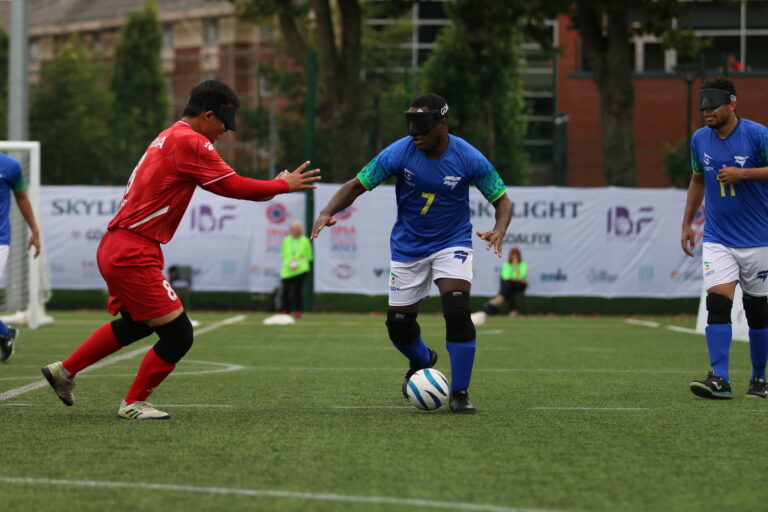It's been 18 years since 34-year-old Gefinho, one of the most experienced Brazilian players in blind football, made his international debut. Destiny has chosen Argentina's capital Buenos Aires as the venue for his 2006 IBSA Blind Football World Championship.
“The worst part of that milestone was losing 1-0 in the final against our eternal rival!'' Gefinho said.
Two years later, at the 2008 Beijing Games, Brazil once again clinched the Paralympic title, becoming the only team to win a gold medal at the world's biggest sporting event.
Having been involved in blind football for many years, Gefinho is one of the few people who can talk to wealthy people about the evolution of blind football to date.
“We also talk among the players that blind football has evolved a lot over the last 15 years. When I started, it already had its own dynamics, but the players had very clearly defined their positions. The forwards were the forwards. Even though the defenders had to protect, we stayed out of the area and made the most of our strengths. There was a lot of space between the players and the line. , there were even some tactical schemes: the goalkeeper always puts the ball in the attacking area for the striker to score a goal. Over time, the situation has gotten much better and today it is completely different. Much more. movements, different tactical schemes and the use of pivot players, but we did not use them at all. Even in terms of defensive tactics, such as those adopted by Argentina, it is very difficult to overcome. is.”
Amazing China in Beijing 2008
Its evolution quickly spread around the world. Gefinho pointed to the example of China, which carefully and secretly prepared for the Paralympic Games in his country and then showed up in Beijing with something new.
“This was a great first ever competition for them and they played fast blind football and focused on getting the ball up the field in a great way. I think their ball transmission is the best in the world! Very It's fast, it's unbelievable. In a way, they adapted in the best way we could and forced everyone to see other countries rise in blind football, like Iran, and more recently Morocco.”

That's why Gefinho told IBSA that Brazil has gone to great lengths to keep up with the latest developments in the sport and never lose its edge, and named those responsible.
“Our national head coach, Fabio Vasconcelos, is a real visionary. He has a lot of ideas and brings a lot of new things to improve our sport. He brought his experience as a futsal player to play blind football and we learned a lot from that.”
With so much change in the sport in recent years, how has Gefinho been able to adapt, evolve and remain a singles player today? Gefinho was named the world's best blind soccer player in 2010 It was considered to be
“[Laughs] With all these changes we are going to suffer a little bit, but especially for the strikers. All strikers love to play with the ball next to their feet, but we have to adapt quickly to the way football is played. At some point, he started practicing more on defense to get back on defense after his offensive play wasn't working very well. What Fabio calls “returning”! It is very important to help the team recover from potential ball losses and counter-attacks.
Visually impaired players vs regular goalkeepers
One thing that can cause confusion for people who aren't very familiar with blind soccer is that the goalkeeper is a person with direct vision. How they can score goals, and sometimes what kind of goals they come up with! – anyway?
“I think this is probably the most frequent question asked by those new to our sport. The job of a goalkeeper is not so easy. The area in which they are confined is very small, Most of the space to act is cut out. They have to wait for the right moment to make a defensive move, which makes their job very difficult. Anyway, the strikers also shoot towards goal I practice a lot.”
In addition to the quality of soccer at their feet, blind soccer players also need the help of a guide behind the goal to aim for the goal.
“The role of the guides is also very important. We have to concentrate completely on their voices in order to hear the correct instructions that they are giving us. Blind football requires a lot of concentration. We had to be able to clearly hear the ball, our teammates, our opponents, our guides, and even our coach from the bench. Everything happened at the same time while the crowd pushed us up in the stands. We We have to ask the public to be quiet, but we understand to some extent that the public is making noise. They are rooting for us! In a sense, the guides are looking at our playing field. Their presence and their call to action is very important to us.”
5-time Paralympic Champion Quest
Gefinho has already won four Paralympic titles during his impressive curriculum. Beijing, 2008. London 2012; Rio 2016; The Brazilian star is looking for a fifth man, so he may leave Paris 2024 with his hand held high, showing everyone his five fingers. Which one has been the most special so far?
“Sorry for the cliché, but everyone was special. Everyone has different things that make their lives special. For example, in Beijing we were losing the game, but when the final whistle rang at 30. We scored a goal seconds in. In London, we had a shootout penalty shoot-out in the semi-final against Argentina, and in the final against France we conceded a lot of goals. In Rio, we only scored in the final against Iran. That one goal was the only goal Iran suffered in the entire tournament. Can you imagine that? In Tokyo, we were hit by rain in the semi-finals and the final, which hampered our football. The victory was greeted with all our soul on the field. Okay, I have to say that Rio was very special at home, with thousands of fans always following us everywhere. It was an amazing moment that I will never forget.”
Despite this, the duration of the Paralympic Games was shortened due to the effects of the new coronavirus, and Tokyo 2020 was postponed to 2021. Along the way, Brazil also lost to Argentina in the 2023 IBSA World Games and America Cup in Birmingham, England. Brazil won the last Para-Pan American Games in Santiago in 2023, so Gefinho believes Brazil will be as strong as ever in Paris in 2024.
“We work for it every day! Morning, afternoon, sometimes Saturday. We are committed to staying in Paris in the best possible condition. As athletes, we We are always looking for more achievements. In Brazil, we are not too satisfied with what we have achieved in the past. We are looking forward to future titles and hope that Brazil remains the only Paralympic champions in the world. I can't give up supremacy so easily!”
Photo credit: Renan Cacioli/CBDV

